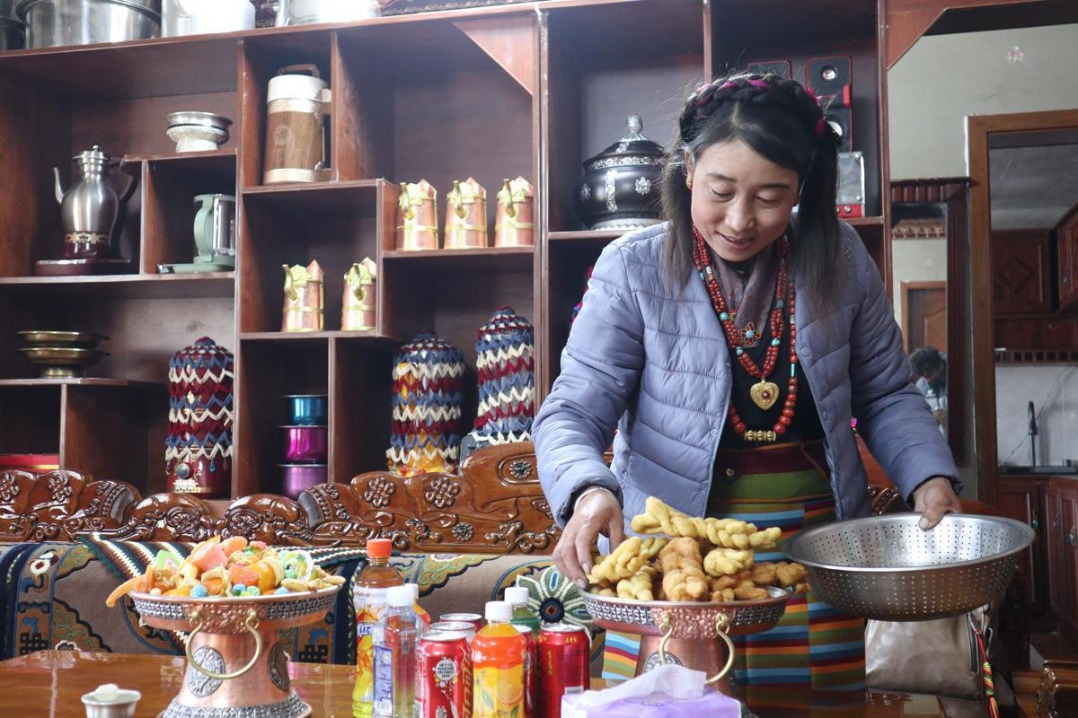Protection of minors given greater focus

Safeguarding children's rights stressed in series of legal and policy initiatives
China has strengthened laws that protect minors' rights and interests in recent months, including the newly amended Criminal Procedure Law that will take effect on March 1.
The Supreme People's Court recently released an interpretation that outlines the implementation of the revised law. The interpretation, consisting of 27 chapters and 655 articles, has more detailed provisions on the protection of minors' rights than a previous interpretation in 2012.
It makes clear that if a minor is interrogated in the absence of a legal representative or an adult, the minor's confession shall be excluded from use as evidence.
It also stipulates that in cases involving sexual assault or violent harm of minors, courts should simultaneously record audio and video while interrogating victims and witnesses and the recording should be completed in one go.
Cooperation with other departments should be strengthened to enable psychological intervention, financial assistance, legal aid, school transfers and other protective measures for minors and their families involved in cases of sexual assault or violence.
The interpretation was released following a series of revisions of other laws by China's top legislature over the past few months that all aim to better protect minors.
In October, the Standing Committee of the 13th National People's Congress adopted the revised Law on Protection of Minors. The law, which will take effect on June 1, clarifies guardians' responsibilities, adds a chapter specially dedicated to protection in cyberspace-specifying that internet products and online service providers should not induce addiction among minors-and also clarifies schools' responsibilities in handling sexual assault, harassment and bullying.
The amended Criminal Law, which was adopted in December and will take effect on March 1, stipulates heavier punishments for those who sexually assault girls, and the Law on Prevention of Juvenile Delinquency was also amended to redefine misbehaviors and serious misbehaviors and their corresponding interventions.
After the laws were revised, the Supreme People's Procuratorate, China's highest prosecution and investigation agency, urged prosecution agencies nationwide to improve their work in protecting the rights of children in litigation.
In January, 10 departments, including the ministries of civil affairs, education and public security jointly issued a guideline on aiding and protecting minors left without guardians due to unexpected events.
The guideline urged authorities to improve work in protecting minors without guardians, stipulating that if parents or other guardians are temporarily unable to fulfill their responsibilities due to circumstances such as accidents, the parents and relevant authorities must promptly report the case to civil affairs or public security departments, who will provide temporary guardianship for the children.
Also in January, the Supreme People's Court released a guideline on handling juveniles' trials, calling on courts at all levels across the country to offer psychological, economic and educational support to children when hearing cases involving violence and sexual assault.
Yuan Ningning, a researcher at China University of Political Science and Law who specializes in laws related to children, said China has beefed up efforts in legislation, law enforcement and justice to protect minors in recent years.
Practice and some extreme cases over the past few years, especially those related to school bullying, sexual assaults and violence, had revealed imbalances and inadequacies in the protection of minors' rights, especially those of victims, prompting the string of legislative and administrative measures, he said.
One outstanding feature of the recent policies and legal documents is that the provisions are very specific and precise, responding closely to prominent and practical problems, Yuan said.
For example, the policy related to guardianship was a response to the absence of a State guardianship system before the 10 departments issued the guideline last month, clarifying the authorities' responsibilities when families fail to keep children safe.
"They have strong practicality, facing up directly to the prominent problems that the public is very concerned about," he said.
Yuan said the legislative efforts also showed that the legal system for the protection of minors is becoming increasingly complete. Through the rule of law, a legal system that is centered on the Law on the Protection of Minors, together with complementary laws and other judicial interpretations, has been formed and progressively improved.
However, Yuan pointed out that implementation may still face challenges and needs more concrete guidance. Professional psychological counselors are still in short supply across the country and while prosecutors or police may need relevant training, such qualifications may not be sufficient at first.
The financial and legal aid mentioned in the Criminal Procedure Law often require not only judicial powers, but also the cooperation of other government departments such as health and civil affairs agencies, requiring further clarification of functions and seamless coordination among responsible bodies.
"Today's legislation or judicial interpretations were not created out of thin air," he said. "Through numerous practices and explorations by law enforcement forces, the legislation is now able to materialize the comprehensive judicial protection of juveniles in legal provisions, which in turn will help better carry out legal practices."
- China steps up investment in water conservancy over past five years
- Taiwan enters ‘super-aged’ society with 20 pct people aged 65 or older
- Xi's message on China-Africa exchanges draws warm responses
- China makes it easier for families to tap employee healthcare insurance funds
- University of Macao to establish 5 science, technology faculties
- China to step up earthquake preparedness efforts in 2026




































